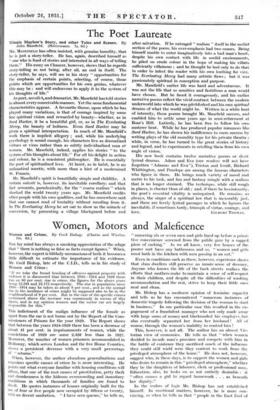The Poet Laureate
MASEFIELD has often insisted, with genuine humility, that he is just a story-teller. He has, again, described himself as " one who is fond of stories and interested in all ways of telling them." His essay on Chaucer, however, shows that he regards story-telling as not being, after all, an end in itself. The story-teller, he says, will see in his story " opportunities for the emphasis of certain points, selecting, of course, those points which arc opportunities for his own genius, whatever this may be : and will endeavour to apply it to the system of his thoughts of life."
As poet, novelist, and dramatist, Mr. Masefield has told stories in almost every conceivable manner. Yet the same fundamental characteristics appear. A favourite theme, upon which he has played many variations, is that of courage inspired by some fine spiritual vision and rewarded by beauty—whether, as in Sard Harker, it be a beautiful girl, or, as in The Everlasting Mercy, the beauty of holiness. Even Sard Harker may be given a spiritual interpretation. In much of Mr. Masefield's work there is implicit allegory ; and, while his underlying psychology is sound enough, his characters live as dramatized virtues or vices rather than as subtly individualized men or women. Mr. Masefield, indeed, applies his stories " to the system of his thoughts about life." For all his delight in action and colour, he is a consistent philosopher. He is essentially the poet of spiritualized love. At heart, as in habit, he is an unfanatical ascetic, with more than a hint of a modernized St. Francis.
Mr. Masefield's spirit is beautifully simple and childlike. A certain naiveté is, however. its inevitable corollary; and that fact accounts, paradoxically, for the " coarse realism " which shocked the world twenty years ago. Mr. Masefleld credits other people with his own qualities, and he has somewhere said that one cannot read of brutality without recoiling from it. In The Everlasting Mercy he set out to show us the miracle of conversion, by presenting a village blackguard before and
after salvation. If he outraged " realism " itself in the earlier section of the poem, his over-emphasis had two causes. Being himself unable to enter imaginatively into a bad man's heart, despite his own contact with life in sordid environments, he piled on crude colour in the hope of making his villain sufficiently villainous ; and he thought he had only to do that in order to infect the reader with his own loathing fbr vice. The Everlasting Mercy had many artistic flaws ; but it was passionately spiritual in conception and purpose:
Mr. Masefield's earlier life was hard and adventurous. It was not the life that so sensitive and fastidious a man would have chosen. But he faced it courageously, and his earlier narrative poems reflect the vivid contrast between the modern underworld into which he was pitchforked and his own spiritual dreinis of what the world might be. Written in a white heat of intensity, those poems brought Mr. Masefield success, and enabled hint to settle some years ago in semi-retirement at Boar's Hill. Latterly, he has been free to follow his own austerer bent. While he has' produced popular romances like Sard Harker, he has shown his indifference to mere success by writing plays of the old morality type for his private theatre ; while, in verse, he has turned to the great stories of history and legend, and to experiments in retelling them from his own angle of vision.
His new book contains twelve narrative poems or short lyrical dramas. Adam and Eve (our readers will not ha forgotten " Adamas and Eva "), Tristan and Iseult, Richard Whittington, and Penelope are among the famous characters who figure in them. He brings much variety of mood and metre to his task, and fun and fantasy mingle with a realism that is no longer strained. The technique, while still rough in places, is chaster than of old ; and, if there be less intensity, the poet's essential vitality is unimpaired. He remains, as always, the singer of a spiritual law that is inexorably just, and there are lovely lyrical passages in which he hymns the inevitable, if sometimes tardy, triumph of virtue, courage, and














































 Previous page
Previous page